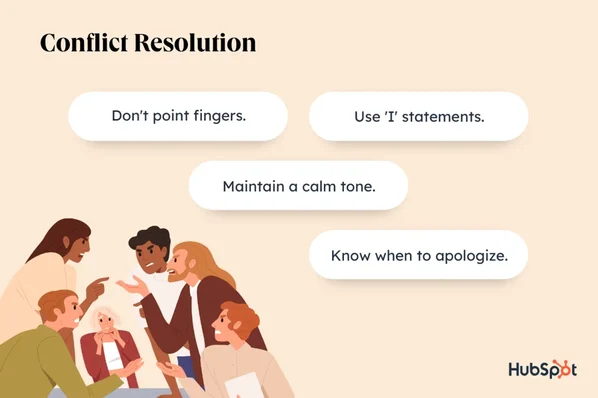11 Things Your Boss Should Never Say to You (And How to Respond)

A common scenario that employees can face in the workplace is unnecessary or rude comments from their boss. And yes, this can also happen often in remote work environments.
While there are more obvious comments that could be considered harassment or bullying, there are also off-handed ones that can catch you off guard.
Whether directly or in a meeting with others, there are a few things your boss should never say to you. And if you hear these common ones below or any variation, it’s time to address it or escalate the issues further.
Things Your Boss Should Never Say to You
1. “I’m your boss, you listen to what I say.”
There are some egos out there in the workplace, especially from those in leadership roles.
But nothing is more motivating to you, than when a boss treats you like a child right? End sarcasm.
This phrase (or a variation) is demeaning. Instead, your boss should be open to any concerns or suggestions. Even if the boss disagrees with your assessment, they should be willing to listen respectfully. It's a big red flag if it’s always “their way or the highway.”
2. “That’s a terrible idea.”
Although you should find a company that loves ideas and that anyone can share openly, it’s not always the case. And sharing ideas with a boss can be daunting, so being shutdown or told your idea is terrible will not feel good.
Plus, this causes other co-workers to avoid sharing ideas in the future that could be beneficial to the team and company. Not good.
Look, not every shared idea is solid or worth pursuing. But strong leaders know how to show gratitude towards the idea and even discuss why it might not be the time to explore that.
3. “This is always how we do things.”
Bosses that are stuck in their ways always annoy me most. Technologies, economic climates, businesses, people – all change and evolve. And if your boss can’t be open to learning or adapting because it’s “new”, it’s a bad sign for the team and business.
The best leaders are those who embrace innovation and encourage their team to find ways to be more efficient. It shows a boss has a low ego and is willing to learn about how a new process, strategy, or technology that can improve the work.
4. “Why do you need time off or a vacation?”
Time off from work is critical to your physical and mental health. And yes, even if you work from home you deserve time off and can experience burnout.

But a boss that doesn’t respect your need for time off or doesn’t openly encourage you to take vacation is a red flag. Everyone should take a vacation nor should anyone feel guilty about utilizing PTO days.
5. “You aren’t paid to share your opinions about [project, task].”
This is one phrase your boss should never say to you. Whether something is outside the scope of your job or not, it should be perfectly okay to voice a concern or share an opinion in a professional manner.
By barking this at you, your boss is being condescending and basically telling you to just stick to your tasks and be quiet. And this statement also ties back to the boss thinking he is always right, just because he is in a more senior role.
6. “Just figure it out on your own.”
I’m a big fan of working autonomously and having the freedom to figure things out in my work. But it doesn’t mean that I also should not be allowed to ask for help and receive that support.
Fortunately, I have not dealt with a boss who would not step in to help during my career so far but I know they exist.
A good leader will never abandon someone on their team that asks for help or isn’t sure of something. Instead, they’ll encourage independence but be there to provide assistance.
7. “I’m disappointed in you.”
Your work will not always be perfect. Mistakes will be made. And maybe you had a bad week or you are unsure about how to deliver a job task. It happens to best of employees.
And a boss should never pull the “I’m disappointed in you” line. Again, it makes you feel like you’re a child. It’s the classic phrase a parent would say. Plus, it doesn’t help the situation and really is demoralizing.
Instead, a good boss may share that they were a bit disappointed by the work but offer a plan to help improve it. Instead, the criticism needs to be constructive with some guidance.
8. “Why can’t you be more like [employee name]?”
Yet another phrase that can make you feel like a child being scolded. You are in a business setting and a working professional, no boss should say this to you.
Plus, this type of phrase will certainly not improve an employees’ performance. What good does it really have?
If a boss has an issue with the quality of work of an employee, it’s best that they have an open discussion together. A good leader will discuss the cause of these issues, create an action plan, and keep unnecessary comments to themselves.
9. “You should be thankful you have this job.”
One snide comment that irritates me is when a boss says you should be thankful for this job.
This might come up if you have faced recent work challenges, maybe missed a deadline, or maybe want to vent for a few minutes.
Yes, you are glad to have a job that pays the bills. But you also do not need passive aggressive comments or a cheap shot at your employment, especially when you may be feeling stressed already.
10. “That’s not my job.”
Even if it’s not the boss's job, if you request help there should be no reason they outright dismiss you because it’s not their job.
Of course you shouldn’t take advantage and ask for help constantly, but once in a while is okay. And the manager should be there to support you and help you with what you need. If you are being ignored or told it’s not their problem, that’s a red flag.
11. “No.”
A simple or aggressive "no" should not be said without any additional justification or help to define it more.
Of course, there are times when an idea or thought might not be a priority. But the boss should always provide context instead of dismissing you and leaving it at that.
For many employees, sharing an idea or bringing up something with a manager is daunting. A good boss will always respond with grace and share why it might not be time to explore it.
Extra: Beyond the things your boss should not say to you, here are the common things they can’t legally do either. Make sure to bookmark this article too!
How to Respond When Your Boss Goes Too Far
So, your boss has been saying some of the above phrases or variations. Now what?
First, if it happens randomly or is out of character for your boss then you may give them a “pass” this time around. It’s possible they are having a bad day or under some pressure from higher up.
However, still make note to have in your records, especially if it bothered you or was offensive. Just in case a pattern starts to emerge here, having things documented will help you later.
Now, if there is already a pattern of this behavior and snide remarks, you’ll want to address the situation sooner than later.
Typically, you can try to professionally confront your boss first. Schedule time to chat or have a personal meeting.

However, they could be the type to overreact or retaliate more. Hopefully not, and instead it’s something they take seriously. Having a civil and respectful conversation should be common, but it’s not always the case.
At this point if nothing is resolved, take your documentation of these things your boss has said and approach your boss's supervisor and a human resource rep.
Final Thoughts
If you’ve tried to remedy the situation with no results, then it’s time to re-evaluate your employment. If so, check out our remote job board for new awesome opportunities.

A good boss will make mistakes at times, we are all human after all. But if they are not self-aware, won’t own their slip ups, and HR is no help, you most likely will be stuck in a toxic workplace.
Just note, there are plenty of great managers and bosses out there. So don’t stay stuck in a job that makes you miserable and stressed.







